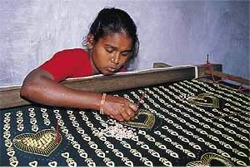|
|
Chin Saik Yoon on how a Chennai NGO is leveraging information and communication technologies (ICTs) for development.


|
| A sari being embroidered by hand in Kunnam Village located 35 km from Chennai. The sari is a popular item with visitors to India Shop. (Photo credit - IDRC, Chin Saik Yoon) |
Joseph recognized the potential of e-commerce to create employment and generate income for young people living in the vicinity of Chennai — particularly to improve the lives of young families. "People spend up to half their salaries on transportation to work, and paying for their meals while at work," says Joseph. "At the same time, their children often come back from school to empty homes because both parents are at work when school is over. If the parents can work from home, they will not only save money, but can also care for their children." In addition to improving the living conditions of the e-marketers, India Shop generates money for the artisans who work in hundreds of villages surrounding Chennai by promoting their products. This keeps centuries-old traditions alive — the handcrafting of saris and the sculpting of Hindu deities, for example. Getting the project off the ground
Joseph, who has a master’s degree in social work and ran his own manufacturing firm before founding FOOD India 20 years ago, worked with Santosh Narayanan, FOOD India’s ICTs coordinator for the past seven years, to create India Shop. "I first got the idea of setting up an e-commerce site when I attended a Pan Asia Networking (PAN) workshop," remembers Narayanan. Held in Singapore in 1999, it introduced participants to various aspects of e-commerce, from the technicalities of building a Web site to the legalities of intellectual property. India Shop became a reality with a $60,000 grant from the International Development Research Centre’s (IDRC) PAN program initiative. PAN supports applied research in ICTs carried out by Asian developing nations. In addition, FOOD India contributed $40,000. The funds were used to cover the cost of staff salaries, 15 personal computers, a digital camera, a wireless router, training for 100 e-marketers, research expenses including reference material (such as guidelines for e-marketers that FOOD India developed), and participation in e-commerce conferences. Training e-marketers to make sales
FOOD India recruits young unemployed or underemployed college graduates as e-marketers, trains them, and encourages them to work from home using a computer and an Internet connection. Some e-marketers work individually, while others organize in small groups to share equipment. FOOD India’s e-marketers are trained to provide online customers with detailed information about their potential purchases — sometimes even visiting artisans to take photos of the texture and embroidery designs of saris, for example, then emailing the images to customers. They also learn the importance of consistent follow-ups to close sales, and how to seek out new customers by visiting chat-rooms and discussion groups about Indian culture. They even pack and ship out the orders. E-marketers earn a sales commission of 10 % of the value of all the goods they help to sell, or between 2,000 to 10,000 Indian Rupees a month (CA $65 to $326). To date, India Shop has trained and employed 100 people aged 22 to 30, 40 % of whom are women. The site has 1,800 products crafted by 40 artisans available for sale, and brings in an average of nearly $3,200 a month, mostly from customers who live beyond India’s borders. In future, India Shop plans to revise its business model to become self-supporting. It will increase prices and start charging a margin for transactions to finance its continuation and growth. A model for other businesses
India Shop’s success has resulted in a number of spin-offs. The site attracted the attention of the Government of India, which awarded FOOD India a five-year contract to establish and manage Internet Bazaar, a cyber shopping mall dedicated to promoting artisans and crafts throughout India. India Shop is also the model for a new home-based merchandising business that will provide income and employment for women. Under this initiative, local women will manage a virtual supermarket. Each will receive a CD-ROM containing a list of basic household necessities, such as sugar, tea, soap, and laundry detergent. They will then take orders from their neighbours, consolidate the purchases using applications on the CD-ROM, e-mail the bulk orders to a local warehouse, sort the delivered orders, and distribute them to customers. Chin Saik Yoon
September 2002 Chin Saik Yoon is a publisher, writer, and editor based in Malaysia. This article comes to India Together by way of The International Development Research Centre (IDRC), Canada.
Contact information: Foundation of Occupational Development (FOOD India), C-Block, 1st floor, Bharathiar Complex, 100 feet Road, Vadapalani, Madras - 600 026, Tamilnadu, India; Phone: (+91-44) 4848201, 4805066; Fax: (+91-44) 4838826;
Website: http://foodindia.org.in, Email: info@foodindia.org.in